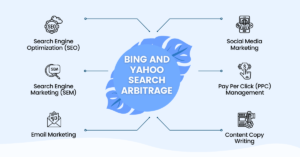Search arbitrage has emerged as a lucrative strategy in digital marketing. It involves buying and selling traffic, leveraging the price differences between platforms.

But how can you maximize your earnings from this strategy? Particularly on platforms like Bing and Yahoo? This article aims to answer these questions.
We’ll delve into search arbitrage, focusing on Bing and Yahoo. We’ll explore how to engage in keyword bidding effectively and how to leverage native search arbitrage opportunities.
Whether you’re a digital marketer, an affiliate marketer, a PPC campaign manager, or an online entrepreneur, this guide is for you. It’s designed to help you diversify your traffic sources and revenue streams through search arbitrage.
We’ll provide actionable tips and strategies. These will help you set up successful campaigns, optimize your efforts, and maximize your earnings.
So, are you ready to dive in? Let’s start our journey into Bing and Yahoo search arbitrage.
Understanding Search Arbitrage
Before we delve into the strategies, let’s first understand search arbitrage. Although this concept has existed for some time, it’s still not widely understood.

Search arbitrage is a digital marketing strategy. It involves buying traffic at a low cost and then selling it at a higher price. The goal is to make a profit from the difference.
But how does it work? And how can you use it to maximize your earnings on Bing and Yahoo? Let’s break it down.
What is Search Arbitrage?
Search arbitrage is essentially a form of online traffic trading. It’s a strategy used by digital marketers and online entrepreneurs to generate revenue.
The process involves buying traffic from one source at a lower cost. This traffic is then directed to a website or landing page. Here, it’s monetized through advertisements that generate more revenue per click.
How Search Arbitrage Works
The process of search arbitrage starts with keyword bidding. Marketers bid on specific keywords on platforms like Bing and Yahoo to attract users to click on their ads.
Users who click on the ad are directed to a landing page. This page is filled with ads from higher-paying platforms. When the user clicks on these ads, the marketer earns revenue.
The profit comes from the difference between the cost of acquiring the click and its revenue. This is the essence of search arbitrage. It’s a game of margins, and the key to success lies in optimizing these margins.
The Fundamentals of Keyword Bidding
Keyword bidding is a critical aspect of search arbitrage. It’s selecting and bidding on keywords that users will likely search for. The goal is to have your ads appear when these keywords are searched.

The success of your search arbitrage strategy largely depends on your keyword selection. It’s important to choose keywords that are relevant to your ads and landing pages. But there’s more to it than just relevance.
Selecting the Right Keywords
Choosing the right keywords requires a deep understanding of your target audience. You need to know what they’re searching for and why. This will help you select keywords that are likely to result in clicks.
- Understand user intent: What is the user trying to achieve with their search? Are they looking for information, or are they ready to purchase?
- Use long-tail keywords: These are longer, more specific keyword phrases. They often have less competition, which can result in higher conversion rates.
- Consider keyword relevance: The keywords you bid on should be relevant to your ads and landing pages. This can improve your quality score and lower your cost per click.
Understanding Bing and Yahoo’s Search Demographics
Bing and Yahoo have different search demographics compared to other search engines. Understanding these demographics can help you tailor your keyword bidding strategy.
- Bing users tend to be older: According to Microsoft, the majority of Bing users are over the age of 35. This can influence the type of keywords you should bid on.
- Yahoo users are diverse: Yahoo’s user base is diverse in age, gender, and interests. This allows for a wide range of keyword bidding opportunities.
- Both platforms have a high percentage of users with a college degree: This can influence the complexity and sophistication of the keywords you choose.
By understanding these demographics, you can select keywords more likely to resonate with Bing and Yahoo users. This can result in higher click-through rates and more profitable search arbitrage campaigns.
Setting Up Your Campaigns for Success
Setting up your campaigns for success involves more than keyword bidding. It requires a strategic approach to campaign setup and optimization, including understanding each platform’s unique features and capabilities.

Bing Ads Campaign Optimization
Bing Ads offers a range of features that can help you optimize your campaigns. Here are some tips to get the most out of your Bing Ads campaigns:
- Use ad extensions: Ad extensions can improve your ad visibility and click-through rates. In your ads, they allow you to include additional information, like business location or phone number.
- Optimize for mobile: Bing has a significant mobile search market share. Make sure your ads and landing pages are optimized for mobile users.
- Leverage Bing’s audience targeting: Bing allows you to target your ads based on user demographics, interests, and more. Use this feature to reach your ideal audience.
- Test and refine: Always be testing your ads. Use A/B testing to determine what works best and refine your campaigns based on your findings.
Yahoo Gemini Campaign Strategies
Yahoo Gemini is a platform that combines search and native advertising. Here are some strategies to optimize your Yahoo Gemini campaigns:
- Use native ads: Native ads can help you reach a wider audience. They blend in with the content on the page, making them less intrusive and more likely to be clicked.
- Leverage Yahoo’s audience data: Yahoo has a wealth of audience data that you can use to target your ads. This can help you reach the right people at the right time.
- Optimize your ad copy: Your ad copy should be compelling and relevant to your keywords. This can improve your click-through rates and conversions.
- Monitor and adjust: Monitor your campaign performance closely and adjust your strategies based on what’s working and what’s not.
Leveraging Native to Search Arbitrage
Native advertising plays a crucial role in search arbitrage. It’s a powerful tool to help you reach a wider audience and increase your earnings.

The Role of Native Advertising in Search Arbitrage
Native advertising refers to ads that match the look, feel, and function of the media format in which they appear. They’re often found in social media feeds or as recommended content on a web page.
In search arbitrage, native ads can drive traffic to your landing pages. They’re less intrusive than traditional ads, leading to higher click-through rates.
Moreover, native ads can help you reach audiences beyond the search engines. This can diversify your traffic sources and increase your potential earnings.
Integrating Native Ads with Search Campaigns
Integrating native ads with your search campaigns can be a game-changer. Here’s how you can do it:
- Use native ads to promote your landing pages: This can drive more traffic and increase your ad impressions.
- Target your native ads to the same audience as your search ads: This can increase your chances of reaching interested users and improving your conversion rates.
- Test different ad formats: Different native ad formats may work better for different audiences. Experiment with different formats to see what works best.
- Monitor your performance: Keep track of how your native ads are performing. Use this data to refine your strategies and improve your results.
Advanced Techniques and Best Practices
Search arbitrage is not a set-and-forget strategy. It requires constant monitoring, testing, and optimization. Here are some advanced techniques and best practices that can help you maximize your earnings.

Improving Click-Through and Conversion Rates
Click-through and conversion rates are key metrics in search arbitrage. They indicate the performance of your ads and landing pages.
To improve your click-through rates, consider the following:
- Write compelling ad headlines: Your headline is the first thing users see. Make it catchy and relevant to draw users in.
- Use ad extensions: Ad extensions can provide additional information and increase the visibility of your ads.
- Test different ad copies: Experiment with different ad copies to see what resonates with your audience.
Improving your conversion rates, on the other hand, requires optimizing your landing pages. Here are some tips:
- Create a seamless user experience: Ensure the transition from your ad to your landing page is smooth and consistent.
- Use clear calls-to-action: Guide your users on what to do next with clear and compelling calls-to-action.
- Test different landing page designs: Experiment with different designs to see what works best for your audience.
Analytics and Performance Tracking
Tracking your performance is crucial in search arbitrage. It allows you to understand what’s working and what’s not and make data-driven decisions.
Here are some tips for effective analytics and performance tracking:
- Use conversion tracking: Conversion tracking can help you understand how users interact with your ads and landing pages.
- Monitor your cost per click (CPC) and return on investment (ROI): These metrics can help you understand the profitability of your campaigns.
- Use A/B testing: A/B testing allows you to compare different versions of your ads or landing pages to see which performs better.
- Adjust your strategies based on your findings: Use the insights from your analytics to refine your strategies and improve your results.
Conclusion and Next Steps
Search arbitrage, particularly on Bing and Yahoo, can be a profitable venture if done right. It requires a deep understanding of keyword bidding, campaign optimization, and performance tracking. But with the right strategies and continuous learning, you can maximize your earnings and achieve your digital marketing goals.
As a next step, consider applying the tips and techniques discussed in this article. Start small, test different strategies, and scale up your successful campaigns. Remember, search arbitrage is a journey, not a destination. So, keep learning, keep testing, and keep optimizing. Good luck!


